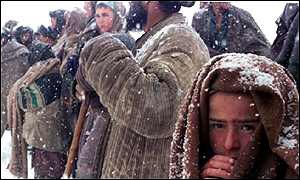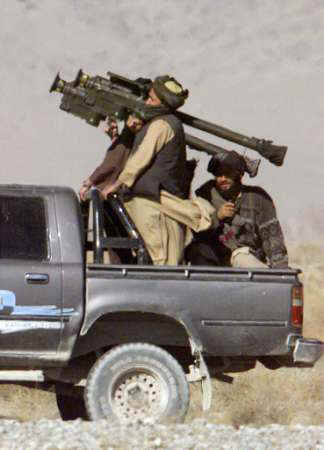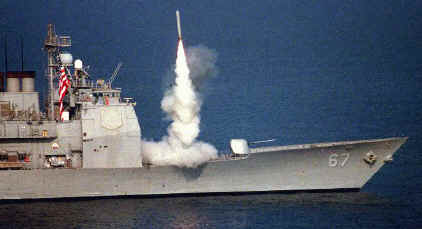I was one of the last American citizens to have spent a great deal of time in Afghanistan. I was first there in 1993, providing relief and assistance to refugees along the Tajik border, and in this capacity have traveled all along the border region between the two countries. In 1998 and 1999, I was the Deputy Program Manager for the UN's mine action program in Afghanistan. This program is the largest civilian employer in the country with over 5,000 persons clearing mines and unexploded ordnance. In this later capacity, I was somewhat ironically engaged in a "Holy War," as decreed by the Taliban, against the evil of landmines; and by a special proclamation of Mullah Omar, all those who might have died in this effort were considered to be "martyrs"-- even an "infidel" like myself. The mine action program is the most respected relief effort in the country, and because of this I had the opportunity to travel extensively without too much interference or restriction. I still have extensive contacts in the area and among the Afghan community and read a great deal on the subject.
 Who is our enemy? Well, our enemy is
a group of non-Afghans, often referred to by the Afghans as "Arabs"
and a fanatical group of religious leaders and their military cohort, the
Taliban. The non-Afghan contingent came from all over the Islamic world to
fight in the war against the Russians. Many came using a covert network
created with assistance by our own government. OBL (as Osama bin Laden was
referred to by us in the country at the time) restored this network to bring in
more fighters, this time to support the Taliban in their civil war against the
former Mujehdeen. Over time, this military support along with financial
support has allowed OBL and his "Arabs" to co-opt significant
government activities and leaders. OBL is the "inspector
general" of Taliban armed forces; his bodyguards protect senior Talib
leaders and he has built a system of deep bunkers for the Taliban, which were
designed to withstand cruise missile strikes (uhm, where did he learn to do
that?). His forces basically rule the southern city of Kandahar.
Who is our enemy? Well, our enemy is
a group of non-Afghans, often referred to by the Afghans as "Arabs"
and a fanatical group of religious leaders and their military cohort, the
Taliban. The non-Afghan contingent came from all over the Islamic world to
fight in the war against the Russians. Many came using a covert network
created with assistance by our own government. OBL (as Osama bin Laden was
referred to by us in the country at the time) restored this network to bring in
more fighters, this time to support the Taliban in their civil war against the
former Mujehdeen. Over time, this military support along with financial
support has allowed OBL and his "Arabs" to co-opt significant
government activities and leaders. OBL is the "inspector
general" of Taliban armed forces; his bodyguards protect senior Talib
leaders and he has built a system of deep bunkers for the Taliban, which were
designed to withstand cruise missile strikes (uhm, where did he learn to do
that?). His forces basically rule the southern city of Kandahar.
During the Afghan war with
the Soviets, much attention was paid to the martial prowess of the Afghans.
The Afghans, while never conquered as a nation, are not invincible in battle.
A "good" Afghan battle is one that makes a lot of noise and light.
Basic military skills are rudimentary and clouded by cultural constraints that
no matter what, a warrior should never lose his honor. Indeed, firing
from the prone is considered distasteful (but still done).
Traditionally, the Afghan order of battle is very feudal in nature, with
fighters owing allegiance to a "commander" and this person owing
allegiance upwards and so on and so on. Often such allegiance is secured
by payment. And while the Taliban forces have changed this somewhat, many of
the units in the Taliban army are there because they are being paid to be
there. All such groups have very strong loyalties along ethnic and tribal
lines. Again, the concept of having a place of "honor" and
"respect" is of paramount importance and blood feuds between
families and tribes can last for generations over a perceived or actual
slight. That is one reason why there were 7 groups of Mujehdeen fighting the
Russians.
It is a very difficult task to form and keep
united a large bunch of Afghans into a military formation. The
"real" stories that have come out of the war against the Soviets are
very enlightening. When the first batch of Stingers (anti-aircraft
missiles, left) came in and were given to one Mujehdeen group, another group
supposedly on the same side, attacked the first group and stole the Stingers,
not so much because they wanted to use them, but because having them was a
matter of prestige.
Many larger coordinated
attacks that advisers tried to conduct failed when all the various Afghan
fighting groups would give up their assigned tasks (such as blocking or
overwatch) and instead would join the assault group in order to seek glory. In
comparison to Vietnam, the intensity of combat and the rate of fatalities were
lower for all involved. As you can tell from above, it is my assessment
that these guys are not THAT good in a purely military sense and the
"Arabs" probably even less so than the Afghans. So why is it that
they have never been conquered? During their history the only events
that have managed to form any semblance of unity among the Afghans is the
desire to fight foreign invaders. And in doing this the Afghans have
been fanatical. The Afghans' greatest military strength is the ability to
endure hardships that would, in all probability, kill most Americans and
enervate the resolve of all but the most elite military units. The
physical difficulties of fighting in Afghanistan, the terrain, the weather and
the harshness are all weapons that our enemies will use to their advantage and
use well. (NOTE: For you military planner types and armchair generals--after
November 1st, most road movement is impossible, in part because all the roads
used by the Russians have been destroyed and air movement will be problematic
at best).
Also, those fighting us are not afraid to
fight. OBL and others do not think the US has the will or the stomach
for a fight. Indeed after the absolutely inane cruise missile strikes of
1998 (below), the overwhelming consensus was that we were cowards, who would
not risk one life in face to face combat. Rather than demonstrating our
might and acting as a deterrent, that action and others of the not so recent
past, have reinforced the perception that the US does not have any
"will" and that we are morally and spiritually corrupt. Our
challenge is to play to the weaknesses of our enemy, notably their propensity
for internal struggles, the distrust between the extremists/Arabs and the
majority of Afghans, their limited ability to fight coordinated battles and
their lack of external support. More importantly through is that we have
to take steps not to play to their strengths, which would be to unite the
entire population against us by increasing their suffering or killing
innocents, to get bogged down trying to hold terrain, or to get into a battle
of attrition chasing up and down mountain valleys.

I have been asked how I would fight the war.
This is a big question and well beyond my pay grade or expertise. While I do
not want to second guess current plans or start an academic debate I would
share the following from what I know about Afghanistan and the Afghans. First,
I would give the Northern Alliance a big wad of cash so that they can buy off
a chunk of the Taliban army before winter. Second, also with this cash I would
pay some guys to kill some of the Taliban leadership making it look like an
inside job to spread distrust and build on existing discord. Third I would
support the Northern alliance with military assets, but not take it over or
adopt so high a profile as to undermine its legitimacy in the eyes of most
Afghans.
Fourth would be to give massive amounts
of humanitarian aid and assistance to the Afghans in Pakistan in order to
demonstrate our goodwill and to give these guys a reason to live rather than
the choice between dying of starvation or dying fighting the
"infidel." Fifth, start a series of public works projects in areas
of the country not under Taliban control (these are much more than the press
reports) again to demonstrate goodwill and that improvements come with peace.
Sixth, I would consider very carefully putting any female service members into
Afghanistan proper because within that culture a man who allows a women to
fight for him has zero respect, and we will need respect to gain the
cooperation of Afghan allies. No Afghan will work with a man who fights
with women.
I would hold off from doing anything to dramatic in
the new term, keeping a low level of covert action and pressure up over the
winter, allowing this pressure to force open the fissions around the Taliban
that were already developing. I expect that they will quickly turn on
themselves and on OBL. We can pick up the pieces next summer, or the
summer after. When we do "pick-up" the pieces I would make sure that
we do so on the ground, "man to man." While I would never want
to advocate American casualties, it is essential that we communicate to OBL
and all others watching that we can and will "engage and destroy the
enemy in close combat." As mentioned above, we should not try to gain or
hold terrain, but Infantry operations against the enemy are essential. There
can be no excuses after the defeat or lingering doubts in the minds of our
enemies regarding American resolve and nothing, nothing will communicate this
except for ground combat. And once this is all over, unlike in 1989 the US
must provide continued long-term economic assistance to rebuild the country.
Our opponents will not abide by the
Geneva conventions. There will be no prisoners unless there is a chance
that they can be ransomed or made part of a local prisoner exchange. During
the war with the Soviets, videotapes were made of communist prisoners having
their throats slit. Indeed, there did exist a a "trade" in
prisoners so that souvenir videos could be made by outsiders to take home with
them. This practice has spread to the Philippines, Bosnia and Chechnya were
similar videos are being made today and can be found on the web for those so
inclined. (see
RAWA) We can expect our soldiers to be treated the same way.
Sometime during this war I expect that we will see videos of US prisoners
having their heads cut off. Our enemies will do this not only to
demonstrate their "strength" to their followers, but also to cause
us to overreact, to seek wholesale revenge against civilian populations and to
turn this into the world wide religious war that they desperately want.
This will be a test of our will and of our character. (For further
collaboration of this type of activity please read Kipling).
This will not be a pretty war; it will be a war of
wills, of resolve and somewhat conversely of compassion and of a character.
Towards our enemies, we must show a level of ruthlessness that has not been
part of our military character for a long time. But to those who are not our
enemies we must show a level of compassion probably unheard of during war. We
should do this not for humanitarian reasons, even though there are many, but
for shrewd military logic.
Richard Kidd
©2001 www.G2mil.com